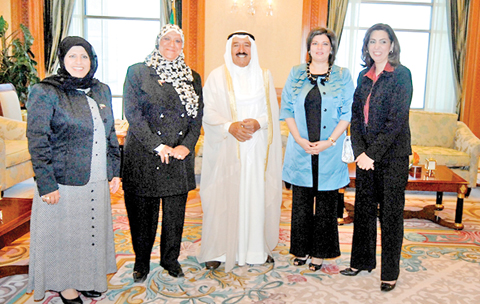 KUWAIT: In this file photo, His Highness the Amir Sheikh Sabah Al-Ahmad Al-Jaber Al-Sabah (center) poses with Dr Maasouma Al-Mubarak (second from left), Dr Salwa Al-Jassar (far left), Dr Aseel Al-Awadhi (second from right), and Dr Rola Dashti (fa
KUWAIT: In this file photo, His Highness the Amir Sheikh Sabah Al-Ahmad Al-Jaber Al-Sabah (center) poses with Dr Maasouma Al-Mubarak (second from left), Dr Salwa Al-Jassar (far left), Dr Aseel Al-Awadhi (second from right), and Dr Rola Dashti (faKUWAIT: The State of Kuwait marks the International Women's Day today by highlighting local women's long road to attain their legislative and political rights. Kuwaiti women's road to recognition was not as easy; they had to earn their rights. In 2005, women won full recognition to participate in the country's legislative and political decision. Nouria Al-Sadani was the first women to submit a complaint to the National Assembly in 1971, demanding that women have the right to vote and participate in the parliamentary election. This demand was well-received by a number of MPs who joined the rally to promote women's right for participating in Kuwait's legislative and political affairs between 1971-1981, but these efforts were not successful.
When the nightmare of the Iraqi invasion of Kuwait was lifted in 1991, these demand continued with MPs continuing to push for women's involvement. In 1999, then Amir Sheikh Jaber Al-Ahmad Al-Jaber Al-Sabah expressed an Amiri desire to involve women in the political and legislative system; however, this particular effort was not successful as the National Assembly failed to pass a bill concerning the issue in the same year.
The struggle ended in 2005 when parliament passed the bill, finally ushering the age when women fully became partners in decision-making. Women had to wait until 2009 to announce their arrival to the political scene. Dr Maasouma Al-Mubarak, Dr Salwa Al-Jassar, Dr Aseel Al-Awadhi, and Dr Rola Dashti became the first women to win seats at the National Assembly, marking a new age of legislative history in the country.
Women in Kuwait have always been an integral part of the country's development, former Minister of Commerce and Industry and Professor at Kuwait University Dr Amani Bourseli said on the occasion. She added that women held various positions in the country; however, that did not mean that there were no obstacles in the way.
Dr Bourseli said that compared to men, women still were not given equal opportunities whether in the job market or senior positions of state. A quota system where in women were guaranteed certain positions in the National Assembly or cabinet might solve this problem, said the academic who hoped that women in Kuwaiti will continue their efforts to develop the country for years to come. - KUNA










